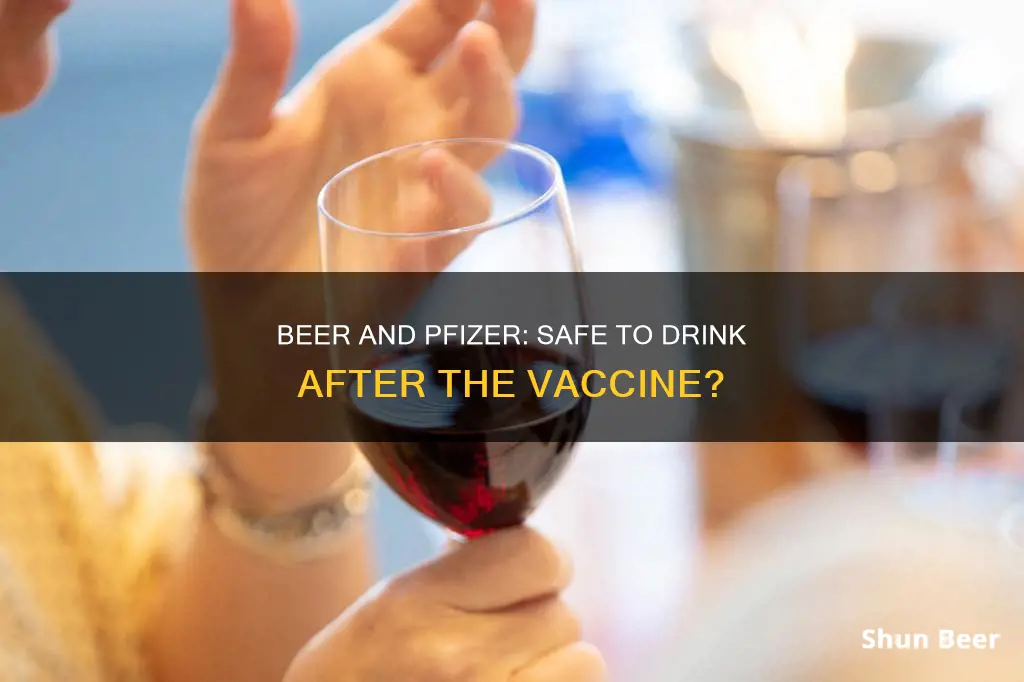
There is no official guidance on drinking alcohol after receiving the Pfizer COVID-19 vaccine. However, experts advise against drinking heavily after getting vaccinated, as it may mask side effects and impair your immune response. Moderate drinking, defined as one drink per day for women and two for men, is unlikely to hinder your immune response. However, heavy drinking can suppress your immune system and increase your risk of getting sick. Therefore, it is recommended to drink in moderation and refrain from heavy drinking, especially during the first two weeks after receiving the vaccine, to maintain your immune system's strength.
| Characteristics | Values |
|---|---|
| Is it safe to drink beer after getting the Pfizer vaccine? | There is no official advice to avoid drinking alcohol after the Pfizer vaccine. However, some experts advise against drinking heavily after receiving the vaccine. |
| How does alcohol affect the immune system? | Chronic heavy drinking has been shown to increase the risk of bacterial and viral infections and lower immunity. Light-to-moderate drinking may improve the response to vaccination. |
| How does alcohol affect the side effects of the Pfizer vaccine? | Alcohol may worsen the side effects of the Pfizer vaccine, such as fatigue, headache, and nausea. |
| How long should I wait after getting the Pfizer vaccine before drinking beer? | Some experts recommend waiting at least 48-72 hours after vaccination, while others suggest waiting two weeks to ensure the immune system is at its best to respond to the vaccine. |
What You'll Learn
- There is no official advice to avoid drinking beer after the Pfizer vaccine
- Heavy drinking may hinder your immune system
- Experts advise against drinking heavily after receiving the vaccine
- Alcohol may worsen side effects of the Pfizer vaccine
- Drinking in moderation is unlikely to impair the immune response to the vaccine

There is no official advice to avoid drinking beer after the Pfizer vaccine
According to the CDC, moderate alcohol consumption is defined as one drink or less per day for women and two drinks per day or less for men. Drinking too much alcohol can inhibit your immune system and affect your body's ability to fight infection. Excessive alcohol consumption can suppress your immune system, increasing your risk of getting sick.
While there is no conclusive evidence that alcohol reduces the vaccine's effectiveness, some studies suggest that alcohol may activate ACE2 receptors, which are the receptors for the COVID-19 virus, and enhance the harmful effects of the spike protein. Additionally, chronic alcohol consumption may exacerbate heart problems after receiving an mRNA COVID-19 vaccine.
It is important to note that alcohol can affect individuals differently, and it is always a good idea to consult with your healthcare provider before altering your alcohol intake or if you have any concerns about side effects after receiving the vaccine.
Beer and Sawan: A Cultural Perspective
You may want to see also

Heavy drinking may hinder your immune system
There is no official guidance on drinking alcohol after getting a COVID-19 vaccine or booster. However, some experts advise against drinking alcohol, especially heavy drinking, immediately after vaccination. While alcohol does not affect the efficacy of the vaccine, it may worsen the side effects of the vaccine, such as fatigue, headache, and nausea.
Heavy drinking may also hinder your immune system. Excessive alcohol consumption can damage your liver, cardiovascular system, and digestive system. It can also negatively impact your immune system, increasing your risk of potentially fatal illnesses. Alcohol consumption can lead to a reduction in the signaling molecules that support the immune system, causing the white blood cells that fight off flu germs and other toxic substances to weaken. Even a single episode of binge drinking can hinder your immune system. Binge drinking is defined by the CDC as consuming five or more drinks for men or four or more drinks for women in about two hours.
Alcohol also affects the gut microbiome, which plays an important role in fighting diseases. It damages the epithelial cells in the intestines, making it harder to absorb nutrients, and disrupts the gut barrier, allowing bacteria to pass into the bloodstream. This can cause inflammation in the liver and may lead to liver damage. Alcohol also reduces the number and function of important cells in the immune system, such as macrophages, T-cells, and B-cells, making it less efficient at identifying and destroying invading pathogens.
Heavy drinking can increase your risk of contracting respiratory illnesses, such as pneumonia, tuberculosis, and acute respiratory distress syndrome (ARDS). It can also increase your risk of other infections, such as HIV, and has been linked to the development of several types of cancer. Therefore, it is important to drink in moderation to protect your health and immune system.
Beer Foam Stones: Do They Work?
You may want to see also

Experts advise against drinking heavily after receiving the vaccine
While there is no conclusive evidence that alcohol reduces the Pfizer vaccine's effectiveness, experts advise against drinking heavily after receiving the vaccine.
Drinking excessively can mask the vaccine's side effects, and you won't know if the vaccine or alcohol is causing a reaction. Alcohol can cause headaches, but so can the Pfizer vaccine. Therefore, it is wise to avoid alcohol until you know how you feel after the vaccine.
According to the CDC, moderate alcohol consumption is defined as one drink or less per day for women and two drinks per day or less for men. Drinking too much alcohol regularly can inhibit your immune system and affect your body's ability to fight infection. Excessive drinking over an extended time can weaken your immune system to the point where the vaccine won't function as effectively.
Dr Fiona Sim, chair of the independent medical advisory panel for alcohol charity Drinkaware, said: "We advise that you don't drink any alcohol for at least two days before, and at least two weeks after, you've been vaccinated, to try to ensure your immune system is at its best to respond to the vaccine and protect you."
It is important to note that the advice specifically refers to heavy or excessive drinking. Light or moderate drinking is not expected to negatively impact the vaccine's effectiveness.
Melatonin and Beer: Safe Mix or Health Risk?
You may want to see also

Alcohol may worsen side effects of the Pfizer vaccine
While there is no conclusive evidence that alcohol reduces the Pfizer vaccine's effectiveness, experts advise against drinking heavily right after getting vaccinated. Alcohol can mask or worsen the side effects of vaccines, such as fatigue, headache, nausea, and pain at the injection site. These side effects may be confused with hangover symptoms.
According to the CDC, moderate alcohol consumption is defined as one drink or less per day for women and two drinks or less per day for men. Heavy drinking can suppress the immune system, increase the risk of sickness, and hinder your body's ability to fight infection.
Some experts recommend abstaining from alcohol for at least 48-72 hours after vaccination, as this is when common and usually mild after-effects of vaccination, like fatigue, muscle aches, and injection site pain, are most likely to occur.
If you decide to drink alcohol after receiving the Pfizer vaccine, it is important to drink in moderation and be mindful of any potential side effects that may be confused with or worsened by alcohol consumption.
Additionally, it is important to note that alcohol can interact with certain medications, such as acetaminophen (Tylenol), increasing the risk of liver damage. It is always a good idea to consult your healthcare provider for personalized advice regarding alcohol consumption after receiving the Pfizer vaccine, as individual circumstances can vary.
Digital Beer Rebates: How Do They Work?
You may want to see also

Drinking in moderation is unlikely to impair the immune response to the vaccine
Drinking in moderation is unlikely to impair the immune response to the Pfizer vaccine.
There is no conclusive evidence that alcohol reduces the Pfizer vaccine's effectiveness. The CDC guidelines for people who have been newly vaccinated do not mention alcohol. Likewise, the Food and Drug Administration (FDA) vaccination fact sheets for the Pfizer vaccine do not reference alcohol.
However, excessive alcohol consumption can suppress the immune system and increase the risk of sickness. Heavy drinking can also mask the vaccine's side effects, making it difficult to determine whether the vaccine or alcohol is causing a reaction. For example, both alcohol and the Pfizer vaccine can cause headaches.
According to the CDC, moderate alcohol consumption is defined as one drink or less per day for women and two drinks per day or less for men. Drinking more than this on a regular basis can inhibit your immune system and affect your body's ability to fight infection.
Some experts advise against drinking alcohol immediately after receiving the vaccine, as hangover symptoms such as fatigue, headache, and nausea may mimic or worsen the side effects of the vaccine. However, there is no evidence that alcohol affects the efficacy of the vaccine.
If you decide to drink alcohol after receiving the Pfizer vaccine, it is important to drink in moderation and be mindful of any side effects that may occur.
Beer and Cefdinir: Is It Safe to Mix?
You may want to see also
Frequently asked questions
There is no official advice to avoid drinking alcohol after getting the Pfizer vaccine. However, some experts advise against drinking heavily after getting vaccinated, as alcohol can worsen the side effects of the vaccine, such as fatigue, headache, and nausea.
Moderate drinking is unlikely to impair the immune response to the Pfizer vaccine. The CDC defines moderate drinking as up to one drink per day for women and two for men.
There is no official advice to avoid drinking alcohol before getting the Pfizer vaccine. However, it is recommended that you avoid alcohol for at least 48-72 hours after the vaccine to give your body time to recover.
It is generally not recommended to drink alcohol while experiencing side effects from the Pfizer vaccine, as it can be difficult to distinguish between the side effects of the vaccine and those of a hangover.
You may consider avoiding alcohol if you have COVID-19. Drinking alcohol, especially in heavy amounts, may weaken your immune system, worsening COVID-19 symptoms and increasing your risk of complications.







